Legislation Impacting Child Labor Laws in the U.S.
Across the U.S., a new wave of legislation seeks to amend the rules for minor workers. Proponents argue that the trend aims to help employers cope with a talent shortage, but observers in and around the employment law sphere advise caution.
State Rollbacks on Child Labor Laws
At least 14 states have introduced or enacted laws within the past two years that relaxed child labor restrictions, according to an analysis by the Economic Policy Institute, a left-leaning think tank.
The nature of each rollback varies by jurisdiction. In New Jersey, for example, lawmakers passed legislation in 2022 to expand summer working hours for minors between the ages of 16 and 18, as well as increasing the amount of time a minor may work before taking a break.
Other laws target specific industries. New Hampshire is one of several states that relaxed age restrictions for minors working in alcohol-serving establishments, reducing the age at which minors may clean tables, empty containers and glasses, and assist in stocking at such businesses from 15 to 14. The same law also extended work hours that minors may work during the school year.
Federal Crackdown Highlights Risks
One common justification for such laws is to ease what some have called a nationwide worker shortage, Rob Wilson, president at HR consulting firm Employco, said in an interview. A report published in June by The Josh Bersin Co. and AMS found that time-to-hire rates increased to an all-time high average 44 days during the first quarter of 2023.
Despite legislators’ intentions, there are a number of factors that HR teams may need to consider before taking advantage of the flexibilities new child labor laws introduce, Wilson said.
Not the least of these considerations is the approach taken by federal law enforcement agencies. Under the Biden administration, the U.S. Department of Labor has conducted several investigations into alleged child labor violations resulting in high-dollar penalties for employers.
Perhaps the most noteworthy case came to light in February, when DOL announced that Wisconsin-based Packer Sanitation Services Inc. paid $1.5 million in penalties after an investigation found at least 102 children ages 13 to 17 were illegally employed at meat processing facilities in Arkansas, Colorado, Indiana, Kansas, Minnesota, Nebraska, Tennessee and Texas.
That same month, news broke that DOL had been in talks with Hyundai Motor Group over child labor violations within the automaker’s supply chain. Later, the agency levied thousands in child labor-related penalties to companies including three Kentucky-based McDonald’s franchisees as well as a hrdive.com

Join us, as fellow seekers of change, on a transformative journey at https://sdgtalks.ai/welcome, where you can become a member and actively contribute to shaping a brighter future.






